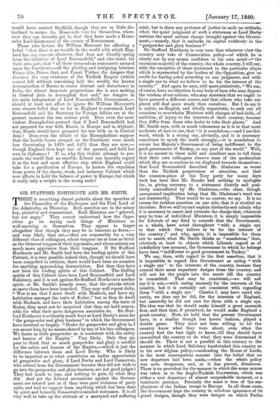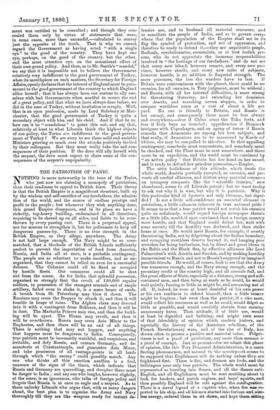SIR STAFFORD NORTHCOTE AND MR. SMITH. T HERE is something almost
pathetic about the speeches of the Chancellor of the Exchequer and the First Lord of the Admiralty, on Thursday. Both speeches are in the minor key, plaintive and remonstrant. Both Ministers are " grieved, but not angry." They cannot understand how the Oppo- sition go on saying such things of Ministers so well-meaning as themselves. They appear to forget- altogether that though they may be as innocent as doves,— and very likely they are,—they are responsible for a very different class of colleagues, whose tongues are at least as bitter as the bitterest tongues of their opponents, and whose actions are much more aggressive than their tongues. If Sir Stafford Northcote and Mr. Smith had been the leading spirits of this Cabinet, it is 'very possible indeed that, though we should have been compelled to criticise, there would have been no occasion for anything approaching denunciation. But then they have not been the leading spirits of this Cabinet. The leading spirits of this Cabinet have been Lord Beaconsfield and Lord Salisbury, and it is not against Sir Stafford Northcote's meeker spirit, or Mr. Smith's homely sense, that the attacks which so move them have been launched. They may well repeat daily, " Woe is me that I must dwell with Meshech, and have my habitation amongst the tents of Kedar ;" but as they do dwell with Meshech, and have their habitation among the tents of Kedar, they must not be surprised that they are held respon- sible for what their more dangerous associates do. Sir Staf- ford Northcote is evidently much hurt at Lord Derby's scorn for "the gunpowder and glory business" in which the Government have invested so largely. "Desire for gunpowder and glory is, I can assure him,by no means shared by any of his late colleagues. We desire as little gunpowder as is consistent with the safety and honour of the Empire." Very likely. Only they ap- pear to think that so much gunpowder and glory is needful for the safety and honour of the Empire,—which is just the difference between them and Lord Derby. Who is likely to be impartial as to what constitutes an undue appreciation of gunpowder and glory, if Lord Derby and Lord Carnarvon, who retired from the Government because they did not wish to go into the gunpowder and glory business, are not good judges ? They had much to lose, and nothing to gain, by what they did. And yet the Liberal accusations against the Govern- ment are treated just as if they were pure violences of party spite, and had no support from anything which has been done by quiet and honestly Conservative-minded statesmen. It is all very well to take up the attitude of a martyred and suffering saint, but is there any pretence of justieein-suolitantattitade; when the quiet judgment of such a statesman as .Lortl'Nrby • sustains the-most serious charge brought against-the Clivern- ment,—namely, that it embarks its capital recklessly in: the "'gunpowder and glory business-?" Sir Stafford Northcote is very sure that whatever view the country may take of Conservative policy—of which he is clearly not by any means confident in his own mind—" the enormous majority of the errantry, the whole country, I will say, with the exception of those interested in the particular clique which is represented by the leaders of :the Opposition, give -us credit for having acted according to our judgment, and with a single eye to what we believe to be for the interest of the country." And again he says, still more plaintively, "-We can.
of course; have no objection to any body of men who may dispute the-wisdom of our actions, who may maintain that we ought to have' pursued•a different course, and that others who take our places will deal more wisely than ourselves. But I do say it is unfair, un-English, and wholly unpatriotic, to seek. out all- occasions to overwhelm Ministers with charges of bad-faith, of ambition, of injury to the interests of their country, because they differ from those who desire to take their places." And Mr. Smith says, with as much vehemence as it is in that most moderate of men to use, that " it is scandalous,—and I use this word, which is a strong one, advisedly, and it is necessary sometimes to speak the truth strongly,—it is scandalous to accuse her Majesty's Government of being indifferent to the good government of Turkey, or any part of world." Well, it is no answer to these mild and excellent men to tell them that their own colleagues observe none of the moderation' which they are so anxious to see displayed towards themselves.; that 'Lord Beaconsfield described Mr. Gladstone as worse than the Turkish perpetrators of atrocities, and that the common-place of the Tory party for many days back has been that Mr. Bourke had nothing to apologise for, in giving currency to a statement directly and posi- tively contradicted by Mr. Gladstone,—the clear, though unexpressed implication being that Mr. Gladstone's word was not trustworthy. That would be no answer, we say. It is no excuse for reckless assertion on one side, that it is rivalled on the other. But we will try and explain distinctly and calmly why it is necessary to assert and reiterate the charge that, whatever may be true of individual Ministers, it is simply impossible for Liberals of any kind to concede that the Government; as a- whole, have acted throughout " with a single eye to that which they believe to be for the interest of the country ;" and why, again; it- is impossible•- for them not to assert, what Mr. Smith thinks so " scandalous;" that, relatively at least to objects which Liberals regard as of indefieitely less moment, the Government to which he belongs have been " indifferent to good government in Turkey."
We say,- then, with regard to the first' assertion; that it is impossible to regard this Government as acting " with a single • eye " to the interests of the country, because -they conceal their most important designs from= the-country; and will not let the • people into the secret till the country is committed. That may be consistent,--we will not say it is not,—with caring sincerely for the. interests of the country, but it is certainly not consistent with regarding them " with a single eye." Charles I. may have cared sin- cerely, we dare say he did, for the interests of England, but assuredly he did not care for -them with a single eye.
His idea was that he should make himself a. great monarch first, and 'then that, if permitted, he would make England a great country. Now, we hold that the present • Government have,. in a similar though less heroic fashion; played a double game. They have not been willing to let• the country know what they were about, even when the country. had the best right to know, till they should have committed the country to do what they were determined it should do. There is not a parallel in this century to the manner in which Lord Salisbury hoodwinked this country as to his new Afghan policy,—misleading the House of Lords, in the most unscrupulous manner into the belief that no new departure had been made,—when the whole policy was . new, dangerous, and, as it has proved, disastrous. There is no precedent for the manner in which the•same course was taken as to the Anglo-Turkish Convention; which was either a new departure of almost unspeakable moment, or a bombastic pretence. Precisely the same is true of the em- ployment of the Indian troops in Europe. In all these cases, the Government kept the country in sedulous ignorance of its grand designs, though they were designs on which Parlia- ment was entitled to be consulted ; and though they con- cealed them only by virtue of statements that were, in some cases, more than uncandid,—calculated to convey just the opposite of the truth. That is why we cannot regard the Government as having acted " with a single eye "• to the good of the country. They have kept one eye, perhaps, on 'the good of the country, but the other, and the most attentive eye, on the sensational effect of their own grand policy. And then, as to Mr. Smith's "scandal," we say that it is impossible not to believe the Government relatively very indifferent to the good government of Turkey, when its mouthpiece on such matters, the Secretary for Foreign Affairs, openly declares that the interest of England must be para- mount to the good government of the country to which England allies herself ; that it has always been our custom to ally our- selves with bad Governments when needful to secure the end of a great policy, and that what we have always done before, we did in the case of Turkey, without hesitation or scruple. Well, that is an open profession, made by Lord Salisbury at Man- chester, that the good government of Turkey is quite a secondary object with him and his chief. And if that be so, how can it be " scandalous " to point this out, and say that, relatively at least to what Liberals think the highest objects of our policy, the Tories are indifferent to the good govern- ment of Turkey / We are sorry to see these mild and amiable Ministers grieving so much over the attacks positively invited by their colleagues. But they must really take the sad con- sequences of their position. If the dove will ally herself with the serpent, the dove must expect to share some of the con- sequences of the serpent's unpopularity.



































 Previous page
Previous page